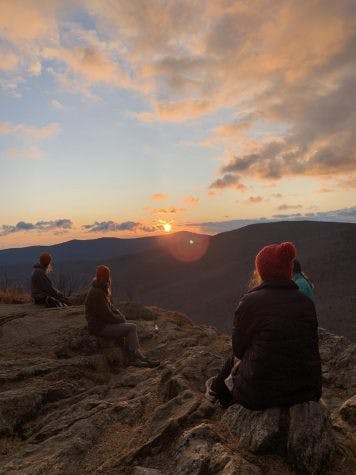MiddKids have long been known for swinging their Nalgene bottles, sporting Patagonia and engaging with the outdoors — all characteristic of what is considered “crunchy.” And while this outdoors- and environment-centric culture permeates campus life, many also find it to be exclusive and inaccessible.
“At Middlebury, there’s a lot of people who are really interested in outdoor recreation and the environment, which is labeled as crunchy on this campus and seems like a large body. Febs often are characterized as crunchy,” Kamryn You Mak ’23.5 said.
After taking the past semester off, You Mak described her experience participating in Feb “crunchy” culture.
“It’s eye-opening seeing how tight-knit this [Feb] community is, where going on a hike is a typical ‘Feb’ activity,” You Mak said. Many students say that there is a stereotype that Febs are more “crunchy,” given that some choose to spend their Feb-mester traveling, working or participating in programs related to exploring the outdoors.
For others, crunchy culture takes on additional cultural and political significance.
“I think typically activities and traits associated with crunch culture are eating alternative diets, hiking and other outdoor activities, a dedication to reducing one’s waste, and wearing brands that claim to be environmentally conscious like Patagonia,” said Elijah Willig ’21.
Jackson Hawkins ’21.5 agreed.
“To me, crunchy culture is rooted in a shared love of the outdoors, but has sort of expanded to more superficial things like the sort of music you listen to or the clothes you wear,” Hawkins said.
According to Hannah Gellert ’22, crunchy culture at Middlebury has different segments.
“There's a vein of it that’s truly engaging with the outdoors and recreating in the outdoors. And then there's a vein that's more performative,” Gellert said, noting that performative crunchy culture involves only wearing typical crunchy brands, like Patagonia or North Face. She said that a third segment of crunchy culture involves environmental activism and sustainable living practices.
Crunchy culture has manifested in tangible ways on campus, from the existence of clubs such as Middlebury Mountain Club to the food options people prefer at the dining hall.
“I have felt more self conscious about what I eat since coming to Middlebury. Upon arriving and interacting with people, I actually learned about the concept of ethical consumption,” Willig said. I never thought there would be environmental benefits to being vegetarian or vegan. I just assumed people either wanted to lose weight or just love animals too much to eat them.”
Willig also noted that there are differences between the ways that certain groups of people on campus eat.
“[I noticed] little things in diet between groups, [like] most white people at Midd don’t touch soda ever,” Willig said.

There are a variety of on-campus groups — with the potential to influence the perception and inclusivity of crunchy culture — that attract students with an appreciation for the outdoors, such as Brooker, the outdoor interest house, or the Middlebury Mountain Club (MMC).
Founded in 1931, MMC is one of Middlebury’s oldest student organizations and offers a variety of outdoor activities year-round, including hiking, boating and climbing trips throughout Vermont and beyond. MMC offers these activities to Middlebury students free of cost.
Historically, their trips have been immensely popular, promoting engagement with and appreciation for the outdoors among the student body. Additionally, MMC hosts social events, provides educational programming and workshops, and runs the first-year outdoor orientation programs.
Current President of MMC Molly Arndt ’23, who hails from Colorado and spent time outdoors growing up, said that she didn’t embrace her “crunchy” side until she came to Middlebury and became involved with the Mountain Club.
“The idea of going out on trips to explore Vermont, an incredible place, has allowed me to get more involved with things like canoeing and climbing,” she said.
Although many students spoke highly of their memories of enjoying these spaces, inclusivity within outdoor spaces was a critical concern for Arndt, who described MMC’s policy of ensuring that all students can participate in the club’s activities regardless of barriers of cost and access to gear. However, Arndt noted the lingering challenges of expanding accessibility.
“This still doesn’t take away the fact that it is an intimidating space to get into,” Ardnt said.
Willig said that conversations about inclusivity and the outdoors should not occur in a vacuum.
“Once, I overheard a hiking group in the Adirondack house talking about how to diversify their group and have more people of color feel comfortable doing outdoor activities — all of which is great,” Willig said. “The meeting was 100% white though. There was no outreach to connect with any cultural organization. No person from the AFC sitting at the meeting. Just white people reflecting on the whiteness of their group”.
In efforts to make outdoor spaces more accessible to all students, MMC has created the Diversity, Equity and Inclusion Officer position, currently held by You Mak. Since the creation of this position, MCC has led several trips that cater specifically to BIPOC students. Although current initiatives have a limited scope with Covid-19 restrictions, the club plans to increase awareness and availability of activities particularly for students underrepresented in outdoor recreation spaces.
You Mak has also spearheaded the creation of Midd FIRE (Fostering Inclusive Recreation Experiences), a student organization aimed at creating a safe, supportive community of and for BIPOC outdoor recreationists.
“It’s a wider issue of people not represented or being able to access the outdoors...Being able to get more people outside is my main goal,” she said.
You Mak also noted the importance of making outdoor recreation equitable at a college like Middlebury, which is known both for its predominantly white and wealthy population and its close ties to the environment.
You Mak’s primary goal is to increase the visibility of a BIPOC outdoor affinity group within largely white-dominated outdoor organizations and spaces through the increased representation and availability of trips to students of color.
Brooker, the outdoor interest house and another hub for crunchy culture on campus, is also grappling with questions related to the outdoors and exclusivity.
“Within Brooker, we’ve realized that this sort of monolithic “crunchy culture” is really quite exclusive and can make people feel distinctly unwelcome, so we’re trying to change that, but it’s hard. When Brooker is seen as a space where “crunchy” people are, that helps set the vibe for what that looks like on campus,” Hawkins said.
Hannah Gellert ’22 shared that Brooker has made some efforts to become more inclusive this year after informally meeting with the SGA Diversity, Equity and Inclusion Committee, including holding more open houses and changing the working on their application. However, she admits that there is more to be done to combat the whiteness of outdoor spaces and “crunchy culture.”
“[Brooker being a majority-white space] is a good example of the overlapping of Midd being a historically white space and the outdoors being a white space. And then, you see that representative who the house has inside of it. Part of that is that you don't want to tokenize people and be like, you’re a person of color, so we're going to automatically take you into the house. Because that's also not productive.”
To challenge and subvert stereotypes associated with “crunchy culture,” You Mak encourages students to reflect on “what [we] grew up thinking, what mainstream environmental culture teaches people and [how to look] critically at spaces at Middlebury and see what can be improved.”

Lucy Townend '22 is a Managing Editor alongside Abigail Chang.
She previously served as a senior section editor, a local editor, and a copy editor.
Townend is majoring in International Politics and Economics, studying French throughout her years at Middlebury and is planning on completing a thesis focused on income inequality and regime change.
This previous summer, Townend interned as a private banking analyst at a mid-sized bank in Chicago and plans to continue her work there after graduation.




